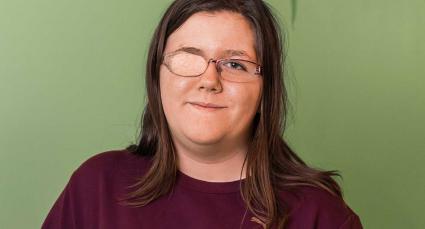Rebecca was 26 weeks pregnant when her water broke on March 4, 2023, while she was home with her two-year-old daughter Ellie.
When the water breaks before contractions start, it’s called prelabour rupture of membranes (PROM), which usually leads to early labour and can increase the risk of infection in both mom and baby.
Rebecca, who was very concerned, went straight to her local hospital, where her care team confirmed her amniotic sac, which surrounds and protects a baby, broke too early. She was immediately transferred by ambulance to the IWK.
“It was very scary,” says Rebecca. “They were concerned that I would have my baby within the next 24 hours, so getting me to the IWK as soon as possible was crucial.”
Rebecca spent six days at the IWK under very close care and observation before being able to return home. Although she didn’t yet go into labour, she and her baby were at high risk of contracting an infection. Rebecca’s local obstetrician would need to closely monitor her and her unborn baby every two days until she gave birth.
Unfortunately, a few weeks after returning home, Rebecca began to feel very unwell. “I was starting to feel pain and run a fever because I developed an infection,” explains Rebecca.
Rebecca went to see her doctor immediately and was airlifted to the IWK for an emergency c-section at 29 weeks and two days. Her blood pressure was dangerously low, and her heart rate was very high.
“It was so traumatic, and my mind was racing so fast,” shares Rebecca.
When Rebecca’s sweet baby girl, Rosie, arrived, she weighed just three pounds and 13 ounces and was very sick. Rosie had contracted Rebecca’s infection and needed urgent care. Rosie was quickly transferred to the IWK’s Neonatal Intensive Care Unit (NICU) and placed on a ventilator to help her breathe because her heart wasn’t working hard enough to produce oxygen.
Thankfully, Rosie pulled through, but she wasn’t yet in the clear.
Because Rosie was born prematurely, she had to have a cranial ultrasound, which takes pictures of the brain and cerebrospinal fluid (clear, colourless, watery fluid that flows in and around the brain), to check for brain bleeds.
Sadly, the test showed that Rosie has a grade 3 brain bleed on one side of her brain and a grade 4 brain bleed on the other.
“A grade 4 brain bleed is the worst you can have, so that was very scary to hear,” says Rebecca. “She was in the NICU for 10 weeks.”
Many serious risks and complications of having a brain bleed include an increased risk of cerebral palsy, developmental problems and hydrocephalus (too much spinal fluid in the brain).
Although Rosie is now home, she is followed closely by the IWK’s Perinatal Follow-Up Program, dedicated to caring for and monitoring babies born prematurely. She is also regularly followed by the IWK’s Neurology Clinic because she has hydrocephalus. The condition is currently stable, but Rosie may eventually need a shunt (a long, flexible tube) to drain the excess fluid.
While Rosie was in the NICU, Rebecca regularly travelled to and from her home in Pictou County to the IWK. She cared for her older daughter at home while also visiting Rosie.
For Rebecca and her partner, Evan, it was a stressful time made more difficult by the added cost of travel. Thankfully, Irving Oil’s Fuel the Care program helped ease some of the financial burdens for the couple. Through the program, Irving Oil fuel gift cards are provided to Maritime families who must travel to the IWK to receive medical care for their child – helping bridge the distance between home and hospital.
“Our IWK social worker told us about the Fuel the Care program, which was very helpful,” says Rebecca. “During a time like that, there are financial hardships, and the Fuel the Care program helped us get through our stay at the IWK. It’s a wonderful program to help families.”
Although Rosie will need to continue to visit the IWK regularly to monitor her brain and development, she is doing well considering everything she’s been through.
“She’s a very happy baby. She loves smiling,” says Rebecca. “It’s just amazing to see how far she’s come.”
To learn more about Irving Oil’s Fuel the Care program, how it supports IWK families who must travel to the IWK for medical care and how you can show your support, please visit fuelthecare.ca



